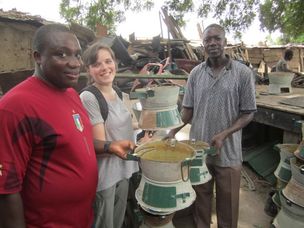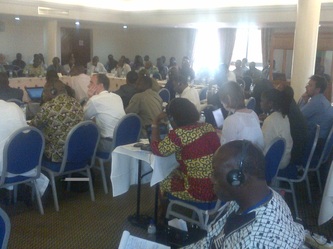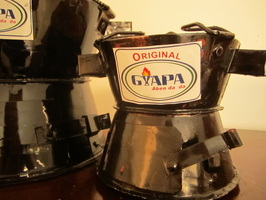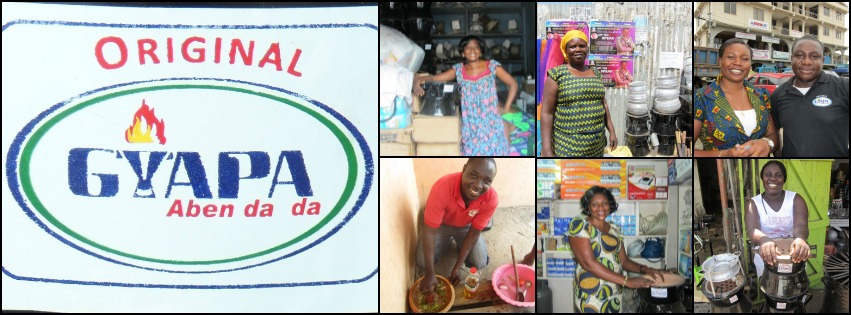Hey, I’m Issy and I’m an intern working with Gyapa Enterprises. I came to Ghana in March, but I had been working remotely from the UK a month prior. The two main focuses of my internship is using GPS and GIS to create a map of all the producers and retailers of Gyapa cookstoves, and also to help develop our various social media channels. I studied Geography at university and developed a keen interest in sustainable development and environmental issues, so I am hoping to increase my knowledge around these subjects and learn about new ones.
Welcome to Ghana.
The first thing that hit me getting off the plan was the heat. I was coming from the UK where snow was forecast - it was a bit of a jump to 25-30C in Ghana! After a long cold winter in the UK, it was very nice to be warm without having to be bundled up in thousands of layers. I arrived on a Saturday, so had the Sunday to sort myself out and get ready for my first day in the office with the team. I spent most of Sunday having a BBQ and smiling to myself as I watched the UK become covered in a blanket of snow.
And the Field Work Begins.
As with any new job, the initial part of the first day is going around the place and meeting everyone, trying to remember everyone’s name. After a whistle-stop tour of the office, it was down to work for my first full day. After a couple of days being office based, researching how other social enterprises use social media, I went out with our driver, Isaac, and Marketing Officer, George, to visit a production site. This was my first chance to see how the Gyapa project works, and it gave me a better idea of what Gyapa Enterprises is all about. It was really cool to see the guys transform scrap mental into the bodies of the Gyapa cookstoves. George told me how each production site makes the handles slightly differently so you can tell where each stove has been made.
 Issy with George and Lucky Issy with George and Lucky This was also where I first experienced the ‘ obruni effect.' Obruni means 'white person' in Twi, the local Ghanaian language, and as we were approaching the site children stayed shouting this at our truck as we rode past. George explained that they were shouting at me. Kids will say this at you whilst passing, almost as if you were a celebrity passing through, and most adults will address you as obruni if they want to speak to you. It is something you soon get used, and comes part in parcel of being an obruni. The visit also allowed me to collect my first lot of photos which we can use for future social media and include in blog posts. This is another aspect of my internship; as photos make such an immediate visual impact, we try and capture as much of what we see when we are out visiting producers and retailers in order to fully depict the Gyapa story. I just hope I have enough space on my laptop for all the images! I really enjoyed my first few weeks in Ghana working with the Gyapa team, and I am looking forward to my time here. I will hopefully learn a lot about social enterprise, social media tactics and relearn GIS. I will be keeping a blog throughout my time here, so keep posted for more updates about my internship and my experiences in Ghana. You can follow Issy's adventures with Gyapa Enterprises in Ghana on our blog, and on her Twitter feed @Issy_01
PRESS RELEASE
Second Consecutive Carbon Credit Issuance Sets Record for Largest for Cookstoves by The Gold Standard Registry – Issued to Relief International/EnterpriseWorks (RI/EW)
Accra, Ghana (May 23, 2013) – For the second consecutive issuance the largest single number of carbon credits for any cookstove project certified by The Gold Standard – the benchmark standard for quality and rigor in the compliance and voluntary carbon markets – has been issued to Relief International’s EnterpriseWorks (RI/EW) division. Over 400,000
| Verified Emission Reductions (VERs) were generated and sold through The Gold Standard Registry; with each VER equivalent to one metric ton of carbon emissions. This transaction firmly places RI/EW as the leader in applying innovative finance to the power of entrepreneurship as a business model to combat poverty. Since 2007, nearly half a million Gyapa™ stoves have been sold, impacting over 2.4 million Ghanaians and saving users over $40.6 million in fuel costs which equates to over 800,000 acres of forests. The success of the project comes as a result of years of innovative work by RI/EW in the clean stoves sector in close partnership with ClimateCare, the U.S. Government’s USAID and EPA, and the Shell Foundation.
This record-breaking issuance of carbon credits is in acknowledgment of emission reductions through the use of Gyapa™ cookstoves in Ghana. Since 2002, EnterpriseWorks (EW) has played a critical role in Ghana realizing sustained growth in sales of fuel efficient cookstoves, capturing carbon credit while reducing disease and poverty. The production, sale and use of these low-cost innovative stoves which were developed by RI’s EnterpriseWorks, drive economic growth along with environmental impact.
| Gyapa Cookstove Carbon Credit Impact | Importantly, they also have a direct health impact by reducing household air pollution. The stoves last longer, reduce fuel costs, and are safer than traditional cookstoves. Registered as a carbon finance program in late 2007, the Gyapa™ fuel efficient cookstove has played a critical role in Ghana, realizing sustained growth in sales through the continued development and success of its local production, distribution and sales network throughout Ghana. RI/EW’s Gyapa™ industry has grown to include over 400 independent producers and 500 retail agents throughout Ghana. RI/EW takes a unique and innovative approach to promoting the Gyapa™ cookstove by partnering with and investing in entrepreneurs to support the continued growth of local industry. The production, sale and use of these low-cost innovative stoves drive economic growth along with environmental impact. The Gyapa™ stove technology reduces charcoal usage by up to 50%, reduces harmful smoke inhalation for the cooks and household, and is more durable and safer than traditional stoves. Gyapa™ stoves are sold in four different sizes to accommodate domestic and commercial cooking needs, providing significant socioeconomic, environmental, and health benefits to stove users and their communities. “Relief International has again demonstrated its leadership in the sector with progressive actions to combat poverty,” says Chip Levengood, Chairman of RI/EW’s Board, “Demonstrating the transformative impact of pairing innovative business strategies with development, this project has solidified itself as the leading improved cookstove program through its second consecutive record breaking issuance.” “Gold Standard cookstoves account for around 75% of carbon market cookstove projects worldwide,” says Adrian Rimmer, CEO of The Gold Standard Foundation, “We congratulate RI/EW’s Gyapa™ project for being part of this and delivering emission reductions and sustainable development impact at such scale.” “Since it was founded, ClimateCare has advocated integrated Climate and Development projects, designed from the outset to protect the environment and improve people’s lives” explains ClimateCare Director, Tom Morton “The Gyapa™ Stoves project is an excellent example of this approach. Having helped structure finance for this project, we’re delighted to see it cutting a record amount of carbon and having such a positive impact on the lives of local people.” ### Media Contact Carole Lundgren, Social Enterprise Development Officer carole.lundgren@ri.org About EnterpriseWorks and Relief International EnterpriseWorks (EW), a division of Relief International (RI/EW), utilizes sustainable, enterprise-oriented solutions to combat poverty’s systemic impacts. For 35 years, EW has built local private-sector driven efficiencies in energy, water, agriculture, and natural products/natural resource management value chains. Relief International is a Los Angeles-based global humanitarian organization that transforms adversity into renewal for the world’s most vulnerable populations. RI/EW’s team of 2,000 relief and development professionals work to bridge the gap between immediate emergency relief and long-term community development through innovative and holistic programming that is grassroots-based. In 2009, EW merged with Relief International bringing together two leaders in their respective fields. For more information, please visit www.ri.org and www.enterpriseworks.org and www.gyapa.com. About The Gold Standard For ten years, The Gold Standard has pioneered the way climate change is addressed. Its ‘results based finance’ approach - in which individuals, corporations and governments buy credits against verified emission reductions and sustainable development outcomes - has channelled more than half a billion Euros into 900+ low carbon development projects that would otherwise not have gone ahead. The Gold Standard was established in 2003 by WWF and has more than 80 NGO partners worldwide. For more information, please visit: www.cdmgoldstandard.org About ClimateCare ClimateCare mobilises the power and scale of private finance to deliver projects with positive environmental and social impacts around the world. We combine the vision of a social enterprise and the commercial experience of an investment bank. Leveraging mainstream funding, we profitably deliver some of the largest, most successful corporate sustainability initiatives in the world. From offices in Africa, Europe and Asia Pacific we help many of the world’s leading brands, organisations and governments scale up the impact of their initiatives. By investing their resources in projects that directly combat climate change and poverty, improve health and increase community welfare, we build better futures for millions of people around the world. For more information, please visit www.climatecare.org.
 Amavi Bada, Regional Enterprise Development Manager, recently attended the West Africa Clean Cooking Alliance (WACCA) conference in Ouagadougou, Burkina Faso. WACCA is an initiative of The ECOWAS Centre for Renewable Energy and Energy Efficiency (ECREEE). This West African regional organization's main objective is to provide access to efficient, sustainable and affordable cooking energy in the ECOWAS (Economic Community of West African States) region. During the 3-day conference, he's been able to share best practices and challenges on clean cooking and how these challenges are overcome from within the region and beyond. In addition, he's engaged and debated on how to achieve an integration of clean cooking into national energy strategies. As a group, participants are taking the dialogue forward on developing policies and planning tools that promote clean, safe, and efficient cooking as a driver of economic growth and improves environmental and social conditions. The group will end the conference by creating and validating the WACCA Regional Action Plan to set the agenda as a region for the upcoming years.
| There was also a 3-day exhibition that showcased regional and international exceptional products, technologies and services in the area of efficient and clean cooking from West Africa and other regions.
Amavi has had the opportunity to engage and connect with other organizations with a passion for clean cookstoves, and look forward to creating partnerships within the region.
| |
 A smaller version of our family-sized cookstove was recently created by local manufacturers for product testing. The smaller sized stove, referred to as "Baby Gyapa" by our Marketing Officers, will be primarily used to boil water in tea pots. "Baby Gyapa" market research will happen in the upcoming weeks, and we'll see how many of these new little stoves we'll want to introduce into the world. If successful, this new little Gyapa cookstove will join our other four larger sizes, giving our customers a versatile range of cookstoves based on their needs.
Welcome to the product line, "Baby Gyapa!"
Akwaaba, welcome to our website and our blog! We're excited you're here and are interested in learning more about what we do in Ghana and West Africa. We operate one of the largest locally-produed carbon-financed cookstove programs in the world. We've built an intricate and effective value chain that can produce and distribute products throughout West Africa. Because of this success, we've been able to add additional high-impact low-cost products to our distribution channels, such as water filters and rain water harvesting and storage devices. We've positively impacted millions of people's lives with our products, and we look forward to showing you this impact through our blog, our website, our photos, videos, and social media channels. We're particularly excited to introduce you to the entrepreneurs in our value chain. We work with over 1,000 entrepreneurs in West Africa, from metal and ceramic artisans, to distributors and retailers. Each one of these entrepreneurs has a story of how Gyapa Enterprises has impacted their life. We'll bring you their stories, as well as notes from the field. Take a tour of our website and let us know what you think. Follow us on our social media channels and sign up for our RSS feed as we keep you updated on our work and impact. Meda 'ase ('Thank You!' in Twi, a Ghanaian language).
|
 Issy with George and Lucky
Issy with George and Lucky 


 RSS Feed
RSS Feed
